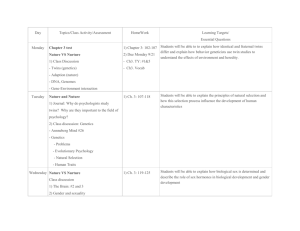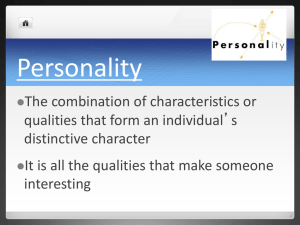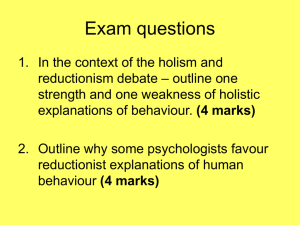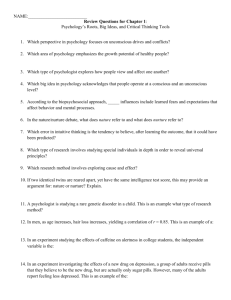The Key Components of the Nature vs. Nurture Debate
advertisement
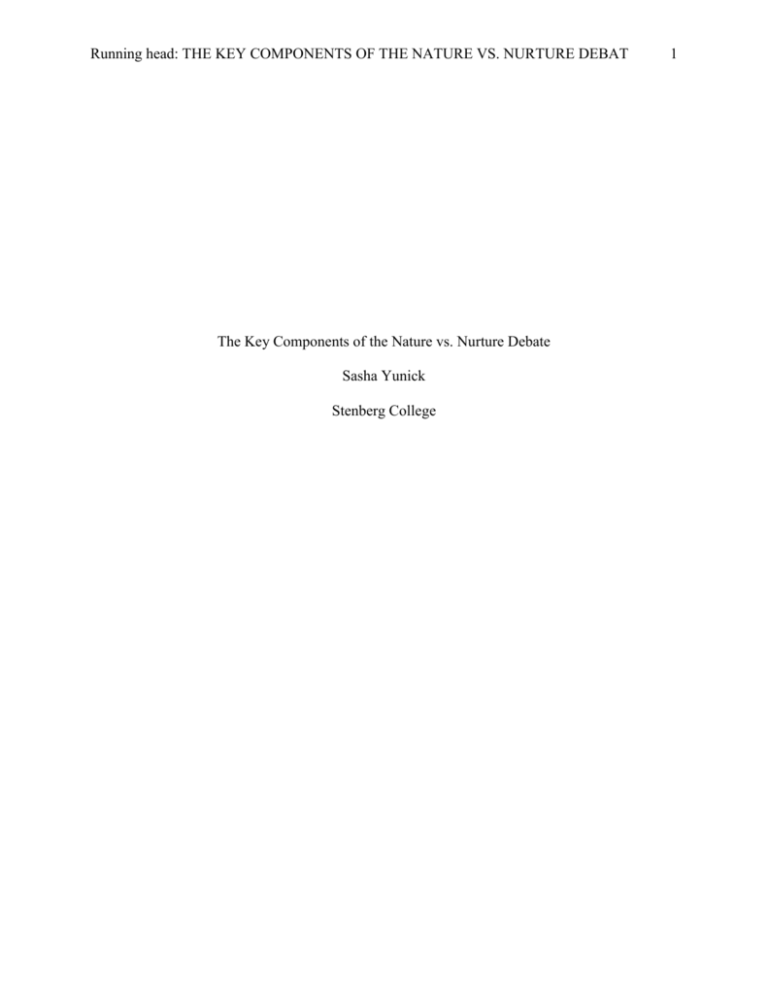
Running head: THE KEY COMPONENTS OF THE NATURE VS. NURTURE DEBAT The Key Components of the Nature vs. Nurture Debate Sasha Yunick Stenberg College 1 THE KEY COMPONENTS OF THE NATURE VS. NURTURE DEBAT 2 The Key Components of the Nature vs. Nurture Debate The nature vs. nurture debate can be considered one of the oldest issues in psychology, with the main question being, “Are human traits present at birth, or do they develop through experiences?” (Meyers, 2013). The nature side of the debate argues that a person’s traits and the way that they develop are strictly through DNA and genetics passed on by parents and grandparents. The nurture side of the debate argues that we are born with a “blank slate”, and that a person’s traits are all developed through experience and their surrounding environment. (Origins, 2011). For decades the argument has gone on starting with Greek philosopher Plato when he believed that individuals inherit character and intelligence. Aristotle argued this and claimed that there is nothing in a person’s mind until it is fed from the external world. (Esterman, 2012). Today the debate continues, though most scientists have come to the conclusion that both nature and nurture shape an individual’s traits and development. (Meyers, 2013). As stated previously, the nature vs. nurture debate has been ongoing for many years. After Plato and Aristotle began the debate, two other philosophers started it up all over again in the 1600’s. John Locke believed that every person is born with a mind that is blank, and it is experience that molds the individual. (Origins, 2011). Renee Descartes disagreed with Locke and argued that some ideas are inborn to an individual at birth. Then later in 1869, polymath Francis Galton found himself intrigued and interested with his cousin, Charles Darwin’s publication of “On the Origin of Species”, and soon came up with the phrase “nature vs. nurture”. (Origins, 2011). Galton believed that intelligence was largely inherited, but he also believed that evolution assured the survival of the best physical and mental traits. (Origins, 2011). Then there was American psychologist John B. Watson, who believed that he could be given a dozen healthy THE KEY COMPONENTS OF THE NATURE VS. NURTURE DEBAT 3 infants and train them to become any type of specialist he chose, such as a doctor, lawyer, artist etc. He was adamant that all he would need to do to accomplish this would be to control and manipulate the environment that the infants developed in; clearly onboard with the nurture side of the debate. (Origins, 2011). In more recent years, modern psychologists have put more energy and concern into factors such as influence on intelligence, personality, and mental illness. (Origins, 2011). It is recognized now that behavior and development are influenced by both nature and nurture. Though it is now recognized that both nature and nurture play a part in the development and traits of an individual, there are many supporting factors to the nature side of the debate. It is evident that certain physical characteristics of an individual come from specific family inherited genes, but what about intelligence, aggression, sexuality etc.? The nature theory suggests that a child’s bad habits and behaviors are due to biological genes that were predetermined at birth, and not due to bad parenting. (Cherry, 2014) One example that supports the nature side of the debate comes from David G. Meyers. He wrote about two male identical twins that had been separated not long after birth and met up 38 years later. The two males were found to be extremely similar personality wise, along with sharing quite similar lifestyles. (Meyers, 2013). This example would support that genes influence a person’s personality and development. Immanuel Kant who was a German philosopher, believed that before an individual’s mind can make sense of an experience, there must be an initial structure in the mind to give meaning to the experience. (Origins, 2011). Galton concluded that intelligence was inherited when he saw through studies that achievement would tend to run throughout families. (Meyers, 2013). There are many supporting factors about the nature side of the debate, but what about the nurture side? THE KEY COMPONENTS OF THE NATURE VS. NURTURE DEBAT 4 The nurture side of the debate suggests that individuals minds are a “blank slate” when they are born as stated by John Locke. (Esterman, 2012). This suggests that humans are born without any built-in knowledge and instead becomes a unique individual through experience, parental guidance, and perception. The nurture side of the debate also suggests that hereditary factors play absolutely no part in the development of an individual. One good question to consider is if a man abuses his wife and children, is it because he was born with violent tendencies or is it something he learned by observing his own parents behavior? In one study it suggests that emotionally reactive and impulsive three years olds developed into impulsive and aggressive 21 year olds. (Meyers, 2013). Then again a child may be born with a very mellow temperament, but grows up in a very abusive household. Though the child’s genes have the potential to influence their development, environmental factors and triggers can switch them on or off. A young child may learn pleasant manners by watching and repeating “please” and “thank you” after their parents, while other children may be rude and aggressive from observing their older siblings act this way. (Cherry, 2014). This would support the nurture side of the debate. The environment is said to trigger one’s gene activity though, suggesting that both genes and environment work together. (Meyers, 2013). The long argued debate of nature vs. nurture has supporting arguments on both sides. In saying that, it also supports that both nature and nurture interact with one another to sculpt every individual’s traits and development. How does one individual of an identical set of twins develop mental illness, and the other remain healthy? Environmental factors such as witnessing a traumatic event that only the one twin saw may have brought this on. But at the same time before this incident took place, the twin’s personalities and lifestyles were basically identical. This is another example that supports both nature and nurture. With the debate being one of the oldest in THE KEY COMPONENTS OF THE NATURE VS. NURTURE DEBAT psychology’s history and still continuing on today, majority of experts believe that both sides of the debate influence behavior and development. The question still remains, “Are human traits present at birth, or do they develop through experiences?” (Meyers, 2013). References: Cherry, K. (2014). What Is Nature Versus Nurture? Retrieved from http://psychology.about.com/od/nindex/g/nature-nurture.htm Cluff, D. Nature versus Nurture. Esterman, J., & Genius, S. (2012). Nature vs. Nurture. Myers, D.G. (2013). Psychology (10th ed.). New York, New York: Worth Publications Origins. (2011). Nature vs Nurture. Retrieved from http://experimentalorigins.weebly.com/nature-vs-nurture.html 5
